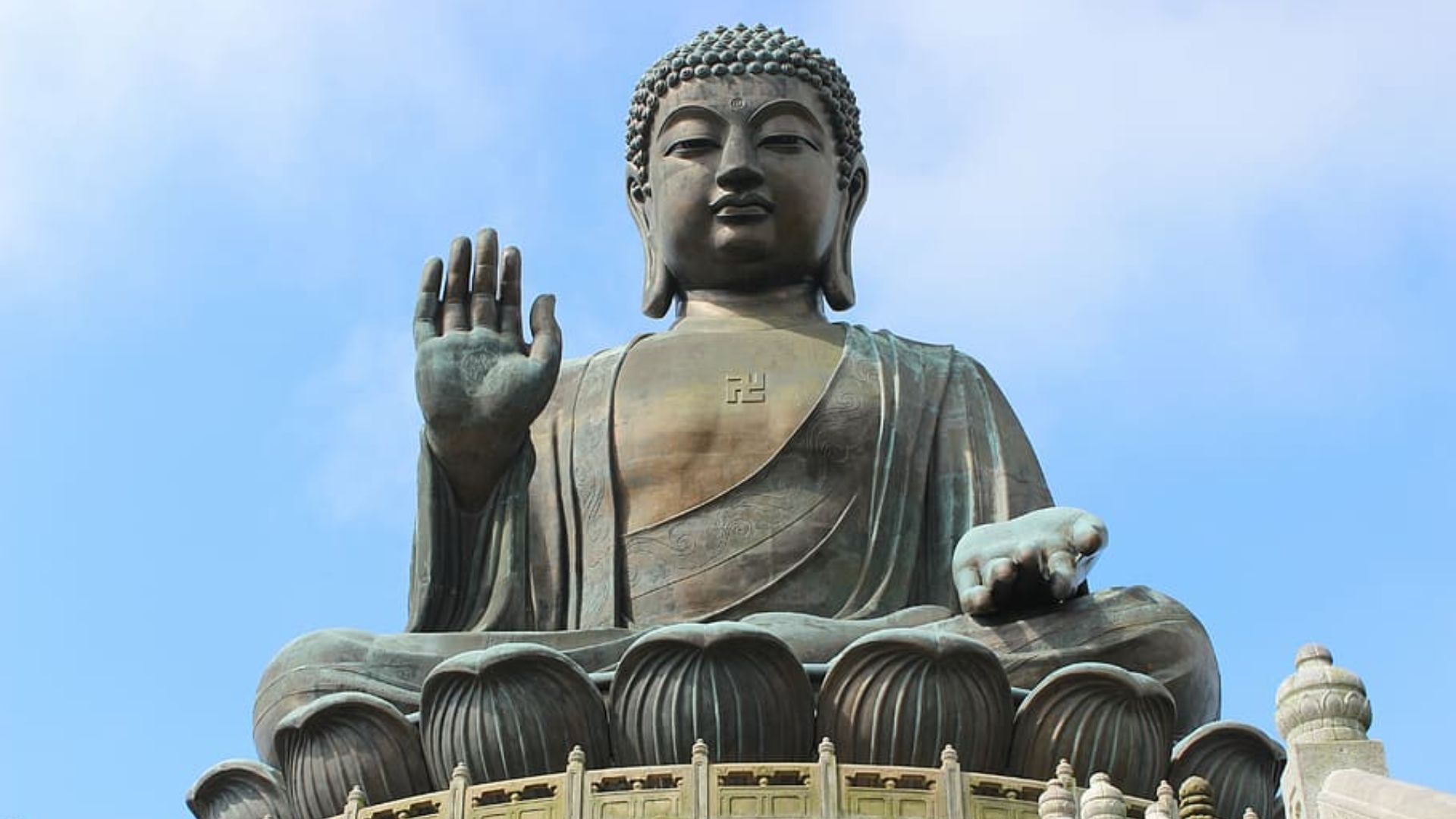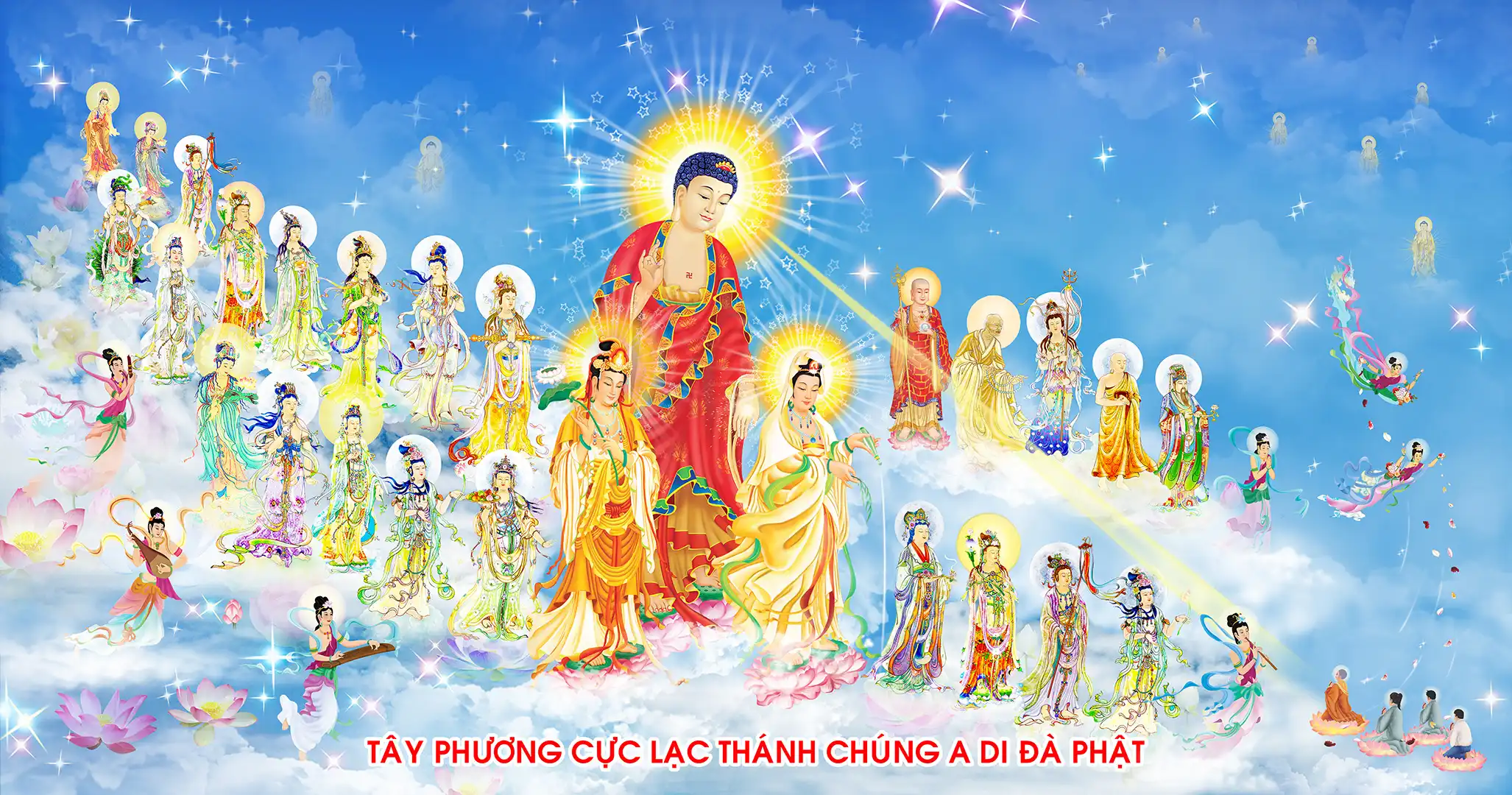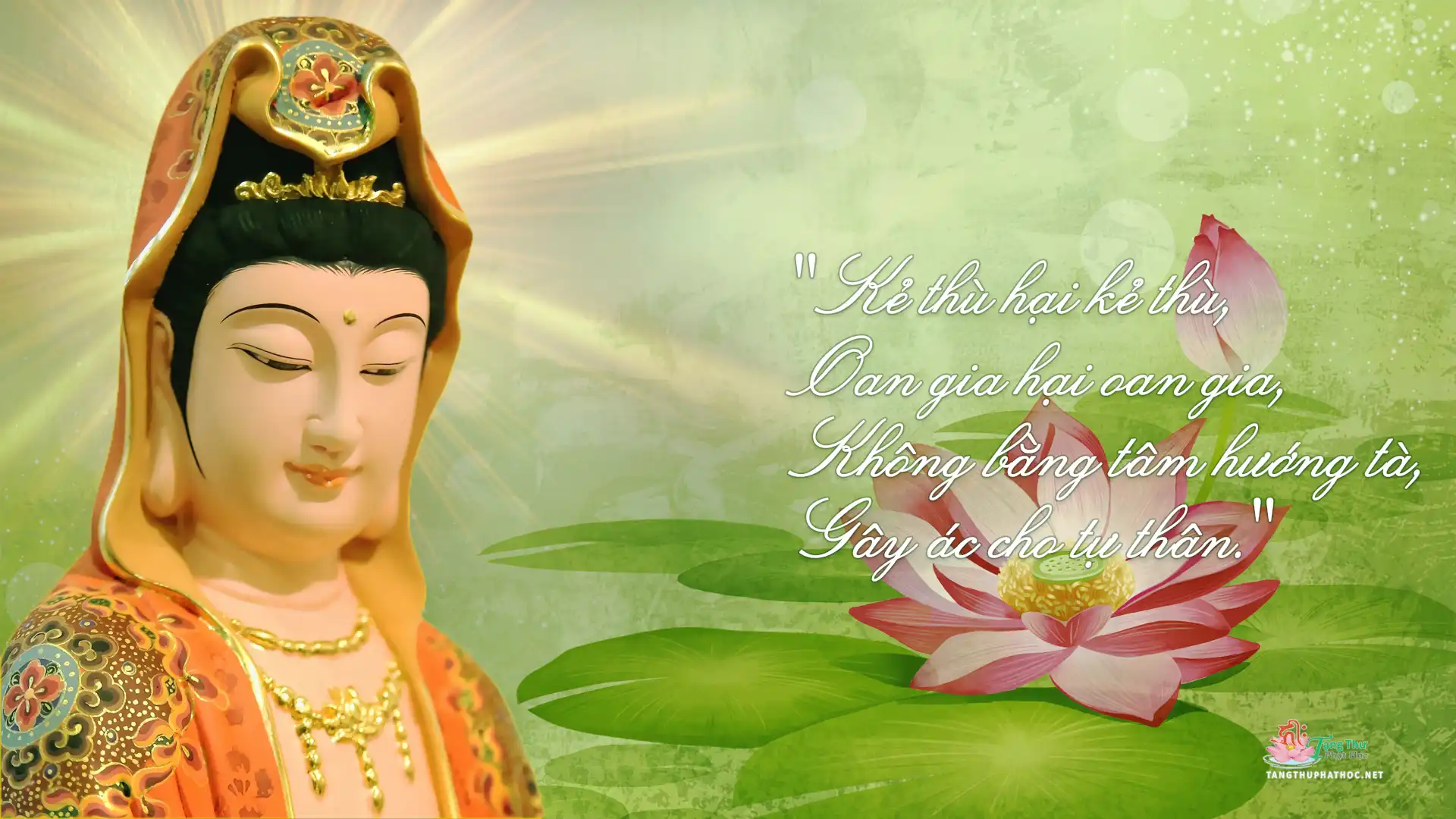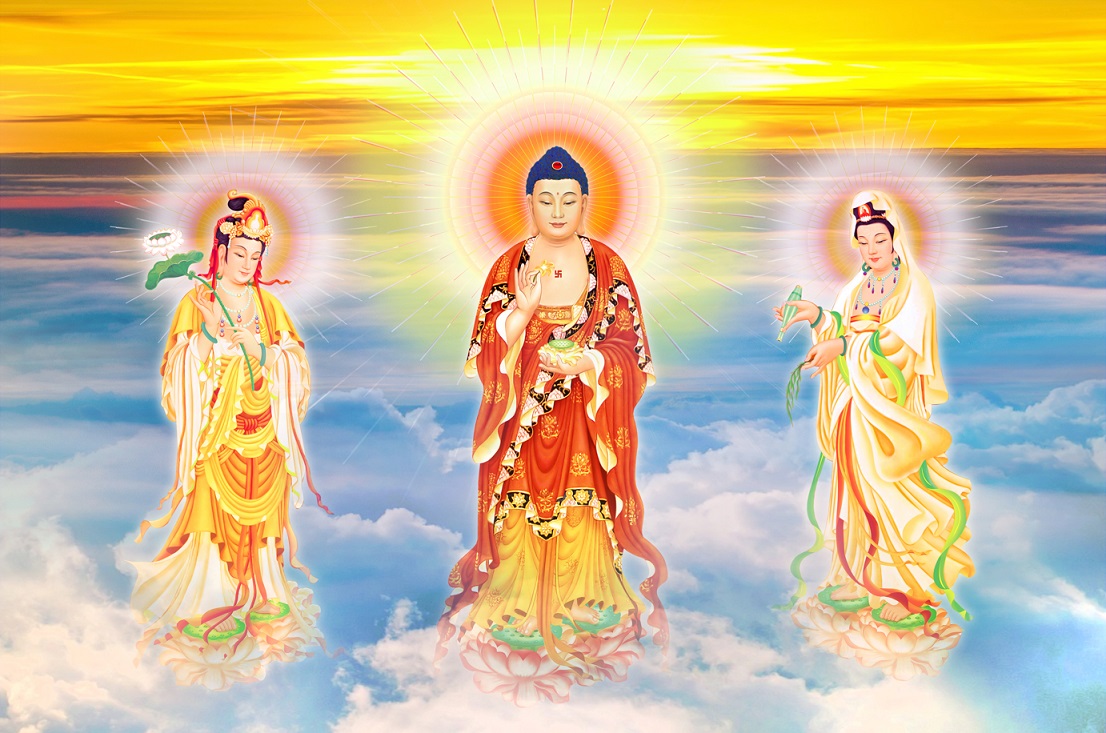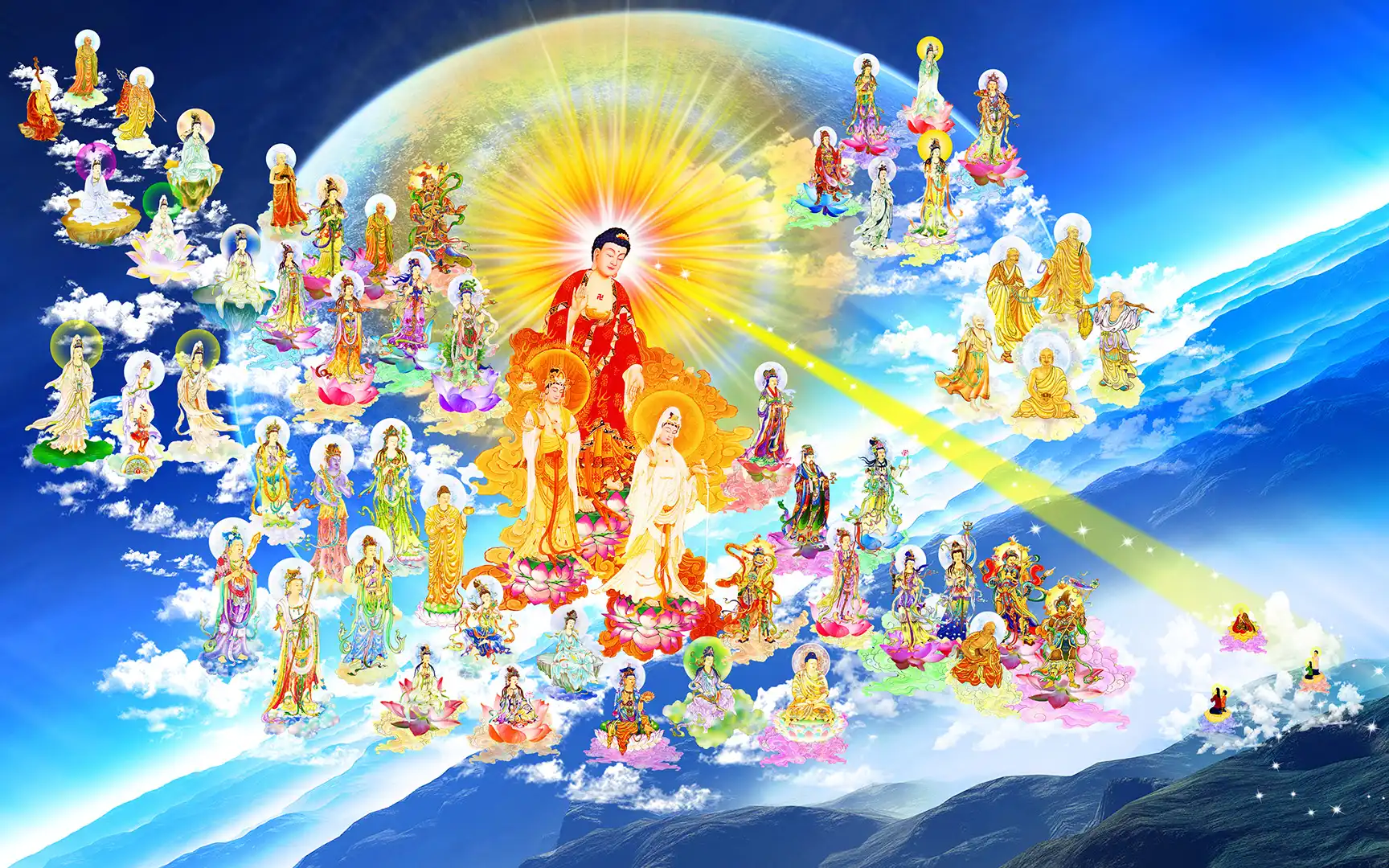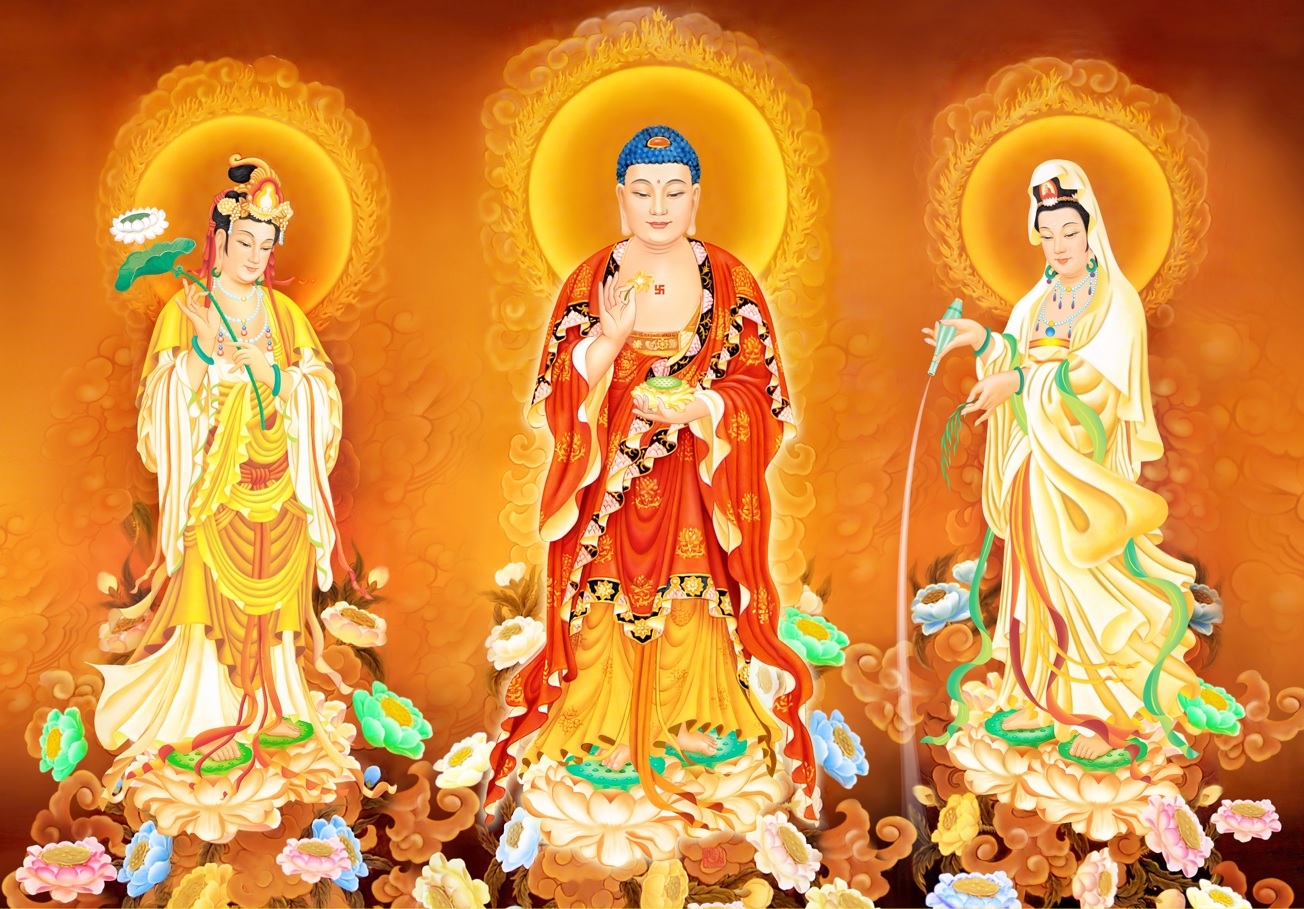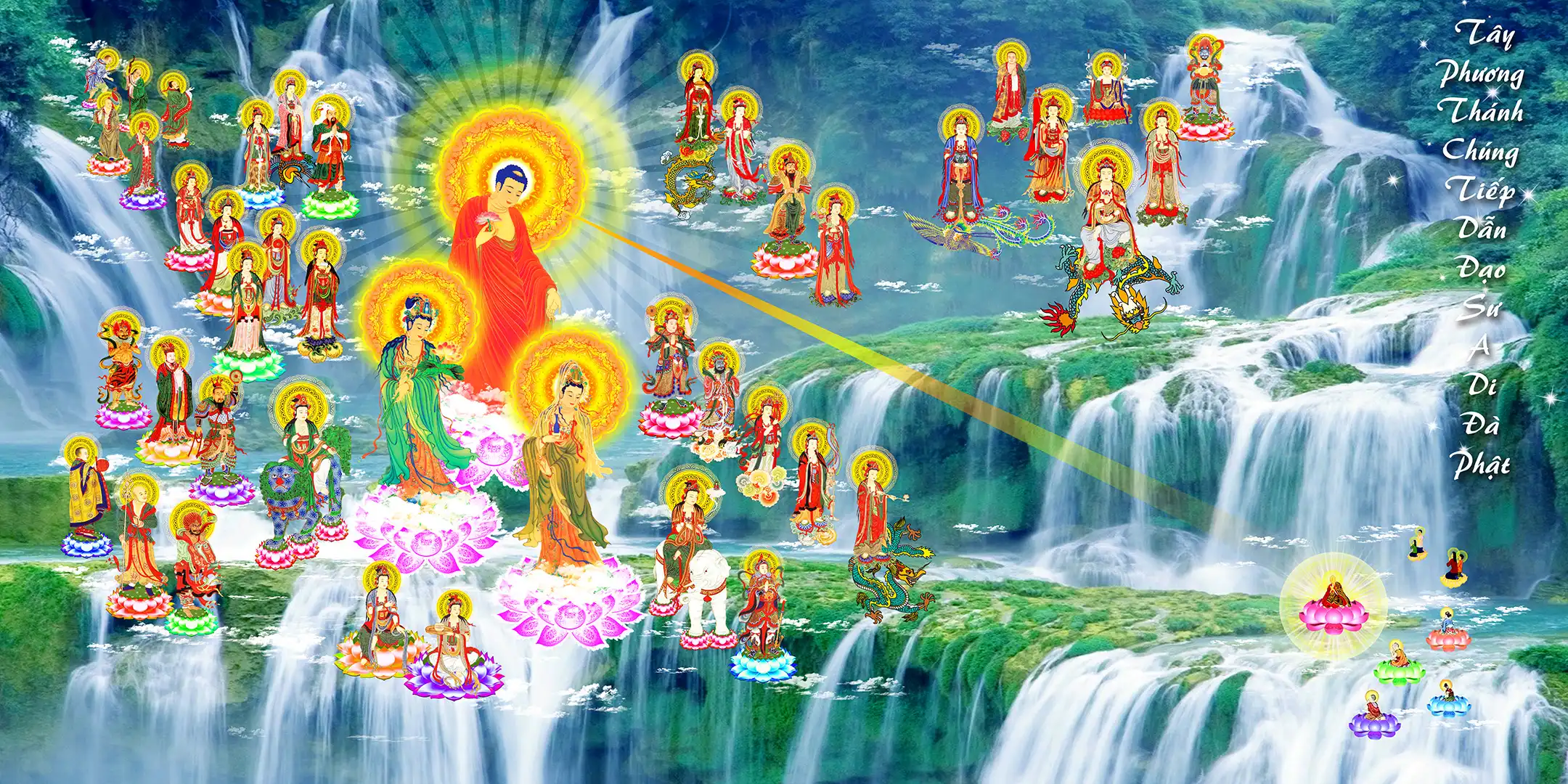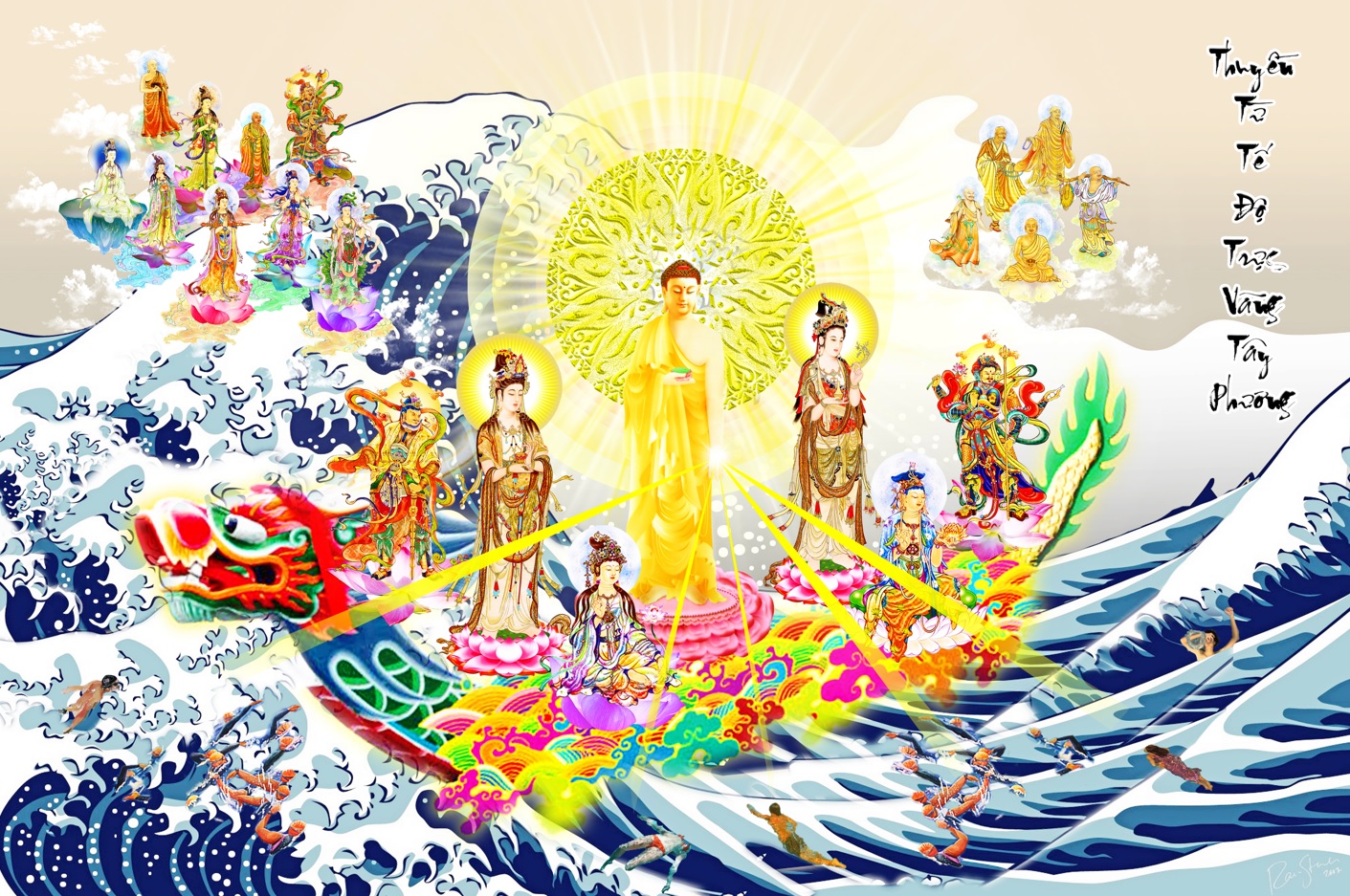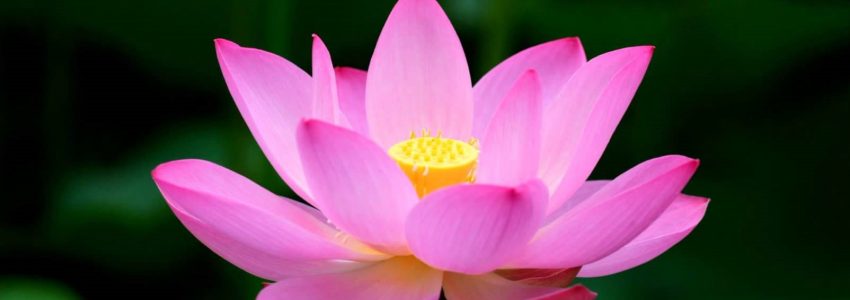REBIRTH VIEWS
IN THE SURANGAMA SUTRA
(Fifth Edition)
Dr. Bhikkhunī Giới Hương

CHAPTER II
THE REASON FOR THE ŚŪRAṄGAMA SUTRA
“Then one day, on the the death anniversary of King
Prasenajit’s father, King Prasenajit arranged a delicious vegetarian feast at his palace and invited the Buddha and his disciples. The king himself welcomed the Tathāgata and his Saṅgha to his royal kingdom. At that time in the city, elders and laypeople also prepared food to offer the Saṅgha. They stood waiting for the Buddha to come and receive offerings. The Buddha commanded Venerable Mañjuśrī to divide the bodhisattvas and arhats to receive offerings from the various vegetarian hosts.
“Only Venerable Ānanda, who had traveled far for a special invitation earlier, had not yet returned, and was late for King Prasenajit’s invitation. He was returning alone on the road without any senior monk or acharya with him. On that day, he had received no offerings. At the appropriate time (to avoid being late at noon), Venerable Ānanda took up his bowl to travel through the city.
“As he began almsround, he first thought that he needed a danapati to be his vegetarian host, and he would not question whether the donor was clean or unclean, rich or poor. That offering was opened-minded, so that all living beings could achieve limitless merit and virtue. Venerable
Ānanda already knew that the Tathāgata, the WorldHonored One, had admonished Venerable Subhūti and Venerable Maha Kāśyapa for being arhats whose hearts were unfair. Therefore, with respect to the Tathāgata’s valuable instructions on impartiality, Venerable Ānanda walked mindfully and slowly through the outer gates in the proper manner of the holy method to obtain food. In the begging process, Venerable Ānanda walked through a house of Ms. Matangi, a beautiful prostitute. By means of a mantra from the Kapila religion, formerly of the Brahma Heaven, Ms. Matangi pushed him into a room to licentiously touch him. He was on the verge of destroying the precept-substance. Knowing Ānanda was being taken advantage of by the indecent artifice mantra, after finishing the meal, the Buddha immediately began his return journey. The king, great officials, elders, and laypeople followed the Buddha, hoping to hear the essentials of Dharma. From the crown of the World-Honored One emitted a hundred rays of jeweled and fearless light. Within the light appeared a thousand-petalled precious lotus, upon which rested a transformation-body Buddha seated in full-lotus posture, who was proclaiming a spiritual mantra of the Śūraṅgama Samādhi.
“He commanded Venerable Mañjuśrī to take the mantra and go, providing protection, and when the evil mantra was extinguished, Venerable Ānanda and Ms. Matangi returned to where the Buddha was.”1
We are thankful to Venerable Ānanda that we have the good opportunity to listen to the Śūraṅgama Sūtra which the Buddha expounded to save Ānanda.
Venerable Ānanda was the Buddha’s cousin. Prince Siddhartha’s father was King Suddhodana, and Ānanda’s father was Dronodana Raja. Devadatta was the brother of Ānanda. Having shaved his head, Ānanda was one of the ten elder pupils of the Buddha and his closest attendant. He was praised as the best learner. He could remember clearly every word of all the Buddha’s teachings. After the Buddha passed away, Venerable Ānanda helped to gather all of the principles, reciting hundreds of sermons that were preached by the Buddha in many places at different times. The lay Buddhists also liked to listen to the sermons that Ānanda preached because he was young, handsome, and talented. The ancestors composed a verse to praise Venerable Ānanda:
His figure is as beautiful as the full moon in autumn
His eyes are as pure as the white lotus
His Dharma lecture is as influent as the ocean
From his mind, many good things aspire.2
One day, Venerable Ānanda had not come back as a result of traveling to a faraway Buddhist event—the Buddha and Saṅgha went for offerings at King Prasenajit’s palace. To avoid being late, Venerable Ānanda took up his begging alone in the city.
First, he wished that he had a danapati who would be his vegetarian host. Venerable Ānanda would not question whether the donor was clean or unclean, rich or poor, as all living beings could achieve limitless merit and virtue. Whoever did not know about Buddhism, how to cultivate or gain merit, Venerable Ānanda wanted to guide her/him in the way of achieving merit by receiving a meal at her/his home.
He was honored in the proper manner of obtaining food. He walked slowly and mindfully through the outer gates, inside gates, city, and then downtown. His performance of the almsfood begging ritual was correct and proper.
The World-Honored One had admonished Venerable
Subhūti and Venerable Maha Kāśyapa for being arhats whose hearts were not fair and equal: For example, Venerable Subhūti preferred to beg in the rich areas while Venerable Maha Kāśyapa favored begging in the poor areas. Venerable Maha Kāśyapa explained that his reason was people were poor because they were lacking merit, so they should be given a chance to make merit. The poor could develop their bodhi-mind by making offerings, that is, improving their poor karma and becoming rich. When a mind of regret or shame aspires to sell belongings to make offerings and earn more merit, then a good result will come. That is why Venerable Maha Kāśyapa focused on begging in the poor areas of the city.
As a result of Venerable Subhūti’s strong meditating power (samādhi) from contemplating emptiness (śūnyatā/suññatā), when he was born, his parents and relatives saw nothing in the room; it seemed to be empty and all physical properties disappeared. Venerable Sāriputta was powerful too.
His wisdom power was so strong that when he was in his mother’s womb, she could give deep lectures and argue philosophy with other scholars in India. Prince Ajātaśatru had an evil mind so strong that the pregnant Queen Vaidehi during her morning sickness, wanted to drink her husband’s blood. These examples are a result of the emanating samādhi power of the mind that affects the surrounding environment. Due to the power of contemplation on emptiness or the detached mind, Venerable Subhūti did not mind that he was gossiped about because he liked to beg only in the rich areas for the delicious food. He thought that the rich who made offerings were not affected by their daily feeding. Therefore, he did not care about the gossip that he preferred to eat delicious meals, chose the luxurious areas for alms, and begged in the wealthy neighborhoods.
Venerable Ānanda remembered that the World-Honored One had admonished both Venerable Subhūti and Maha
Kāśyapa. The Tathāgatas or Buddhas all were fair and equal. They did not question whether donors were clean or unclean, rich or poor. Anyone could make offerings. The Tathāgata preached the Dharma to repay, save, convert, and transform them.
Every day at dawn, the Buddha meditated and spread his compassion in the ten directions. With insight, he contemplated who he would meet that day and where should he go to teach his Dharma. Then he was calm, pure, and serene in his good manner and went to beg for alms in that direction.
After hearing the Buddha’s instruction for Venerable Subhūti and Venerable Maha Kāśyapa, Ānanda begged in an area where people were selfish and stingy. He did not mind whether they were rich or poor or what social class they belonged to. He kept his mind balanced without disturbance. When he passed a house of prostitution, he was waylaid by a powerful magic. Ms. Matangi, formerly of the Brahma Heaven, by means of a mantra of the Kapila religion, drew him into a room to satisfy her sexual urges.
Venerable Ānanda was a quick learner with a powerful intellect, but he did not have enough samādhi strength to protect his virtue. That means Venerable Ānanda was incapable of self-control and this led to loss of his right mindfulness in front of the beautiful geisha.
At that time, the Buddha and Saṅgha were attending the vegetarian feast at King Prasenajit’s palace. With the divine eye, the Buddha knew that his disciple, Ānanda, was being taken advantage of by Ms. Matangi and the indecent mantra and was on the verge of destroying the precept substance. So, the Buddha commanded Venerable Mañjuśrī to take the Śūraṅgama Mantra to protect Venerable Ānanda. From the top head of the Buddha arose a reincarnation of the Buddha
(sambhoga kaya) who was chanting the Śūraṅgama Samādhi mantra.
Sitting cross-legged in the meditation position, a sambhoga kaya of the Buddha proclaimed the mantra. Sambhoga kaya appeared from the Dharma kaya. This is the wonderful application from the body-Dharma that covers ten directions (east, west, south, north, southeast, southwest, northeast, northwest, above, and below) and throughout three times (past, present, and future). It means the mantra from the Sambhoga kaya and Dharma kaya is effective throughout all ten directions and three generations, not only in the present, from the mouth of the Shakyamuni Buddha.
If this mantra from Shakyamuni Buddha is chanted, it was feared that people might misundertand and easily fall into traps (in King Prasenajit’s palace). It means the mantra is experienced as useful only in India, suitable for the time twenty-six centuries ago, but now in 2018 and here (Vietnam or USA) it is not effective. Therefore, the mantra must be spoken from the body-Dharma to affect the three generations and ten directions. As such, the mantra makes more sense, is sacred, and inspires on a large scale.
“Just seeing the Buddha, Venerable Ānanda prostrated, cried sorrowfully, and regretted that from beginningless time he had been a quick learner with a powerful intellect, but had not yet perfected his strength in virtue. He respectfully and repeatedly requested an explanation of the wonderful śamatha, samāpatti, and dhyāna, by means of which the Tathāgatas from ten directions achieved enlightenment. At that time bodhisattvas were as numerous as the sands of the Ganges. Great arhats, pratyekas, and others from ten directions were pleased at the good opportunity to listen to Dharma, and kept silently in their seats to receive the sagely instruction.”3
That was the reason the Buddha started to preach the wonderful śamatha, samapatti, and dhyāna that are contained in the Śūraṅgama Sūtra.
1. Śamatha (tranquility and reflection) is the contemplation. We should contemplate and discriminate which one is true or an illusion. All thoughts are illusory. All objects and bodies are delusion. From the energy of this reflection, the attachment to environment, consciousness, and the body soon disappears. We must understand this section on the theoretical field and distinguish between truth and illusion, the fundamental bodhi, and the root of birth and death.
2. Samāpatti (concentration) is the stopping. We stop to think things over, keep the calm manner, and experience tranquility as an autumn lake. We let falseness drop to the bottom of the lake. It means we return to the essence or the fundamental bodhi.
3. Dhyāna (wisdom): We should apply truth to the illusion, the bodhi mind at the cycle of birth and death, because the true does not differ from the illusion. The illusion does not differ from the truth. The resulting wisdom will be revealed immediately after we achieve the basic wisdom. This is the transferring of the Dharma way of the Tathāgata: transforming afflictions into bodhi and transforming the birth and death into Nirvana (Nibbāna) of the Tathāgatas.
Śamatha is the theory that distinguishes between trueness and falseness.
Samāpatti is the practice of the truth, the fundamental bodhi or basic wisdom.
Dhyāna is the application of the resulting wisdom that all truth is falseness and all falseness is truth. The practitioner will attain the basic wisdom and the resulting insight.
Another way to explain: śamatha is stopping, samāpatti is contemplation, and dhyāna is meditation, explained by Zhiyo Master.4
SUMMARY OF CHAPTER II
Chapter II explains reasons for the appearance of the
Śūraṅgama Sūtra. Venerable Ānanda, who was the Buddha’s cousin and attendant, returned late from a mission and failed to join the Saṅgha for lunch at King Prasenajit’s kingdom. Venerable Ananda went on almsround alone and met Matangi, a pretty prostitute, who makes him almost break his precepts.
The Buddha immediately sent Mañjuśrī to bring the Śūraṅgama-Samādhi mantra to save Ānanda. Ānanda kneels crying, asking the Buddha to teach śamatha, samāpatti, and dhyāna, which are the first cultivating means to transform from the cycle of rebirth into the enlightenment bodhi of the Tathāgatas in ten directions. For this reason, the Buddha preached the Śūraṅgama Sūtra.
DISCUSSION QUESTIONS
1. Please explain why Ānanda encountered the incident with Matangi, and why did he not have enough energy to resist it?
2. What specific quality was Ānanda known for among the great disciples?
3. How did the Buddha reprimand Venerable Subhūti and Venerable Maha Kāśyapa for their unfair almsround practices?
4. Define these words: śamatha, samāpatti, and dhyāna.
5. What is the philosophical meaning of this sentence:
“There is a reincarnation of the Buddha sitting cross-legged in meditation, reading the Śūraṅgama-Samādhi Mantra.”



